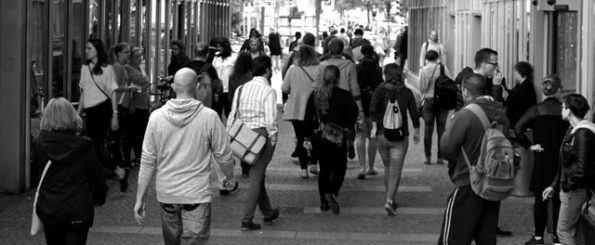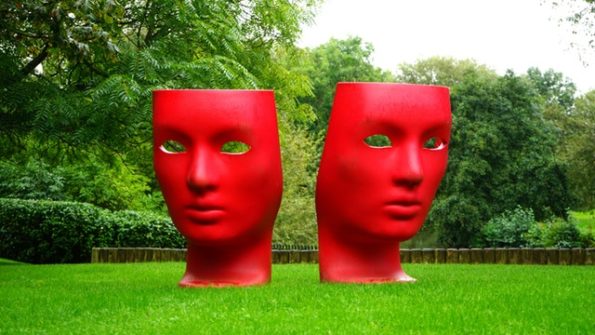[dropcap]M[/dropcap]y aunt and mom have previously been Lutheran pastors, and my dad is currently a pastor at a Lutheran church. My family has a religious background. Sometimes when people hear that both my parents are pastors, they immediately think I’m a saint, and that I could never do wrong. Others call me a snob (not to my face, unless they’re my sisters). I’ve been called perfect. People tell me I’m good at everything. I know this isn’t true, so why do I still try to be good at everything?
After being called smart enough times, I work extremely hard to make sure I’m not seen as any different. I’ve been disappointed at a test score of 95% because it could’ve been 100%. Then, I would turn around and take my frustration out on my family instead of doing something about my frustration.
I’ve sat in my bed, wondering which me is the actual me. Is it the goody-two-shoes perfect student, or the angsty teen who yells at her parents?
I’m guessing as you stand in the mirror getting ready for the day, or lay in bed trying to fall asleep, you’ve experienced an existential crisis. While you lay staring at the ceiling, you ponder your existence and ask yourself life-changing questions instead of falling asleep. Am I a good person? What is my purpose in life? Who am I, really? Did I finish my homework from last night?
Even though most people can’t necessarily answer what their life’s purpose is, they probably have some idea of who they are. All of us have at least some idea of what our identity is.
The Role of Society
This leads us to question where our identities come from. A major part of us is from our parents, and what they raised us to believe. Another part is from the media, and what we come to define as acceptable. An identity begins developing from the moment someone is born. Newborn baby boys are labeled a “ladies man” if they so much as giggle or smile at a female. If they have a certain colored hair or eyes, they are going to be just like their mom. As all of us grow up, we begin to associate more aspects of life with ourselves.
People eventually develop morality and values, but how much of who we are is simply from our parents? Society may have just as much of a role as we do when dealing with how much we truly know ourselves.
Nobody can entirely choose who they are. They absorb the values of the people they’re surrounded by. People pick up the values and expectations of society and follow them as best as possible.
A Life of Acting
Everything that you encounter can influence your identity. Once a label is stamped on us, it becomes a role to play for the rest of our lives. In a Psychology Today article titled “Basics of Identity,” Shahram Heshmat writes, “Each position has its own meanings and expectations internalized as identity.” He goes on to explain that people create identities by “matching one’s talents and potential with available social roles.” This means that we create personas for ourselves based on what is socially acceptable. This plays into the concept of stereotypes and categorizing ourselves.
Every person you have ever seen has made an impact on how you view people.

Furthermore, we define ourselves as what is good. For example, racists wouldn’t necessarily define themselves as racists. Instead, maybe they’d call themselves honest or just.
In the same way, we disregard our perceived bad qualities and see ourselves as good. During a personality quiz, would you rather label yourself as a kind person or a stubborn one? In a survey sent to about 100 classmates, I asked if they considered themselves a nice person. Out of all of them, 84.5% said yes. There were also several people who replied “sometimes” or “it depends.” This isn’t to say that everyone who answered “yes” without hesitation is secretly terrible. It’s just to prove that even when it’s being sugarcoated, people want their identity to fit their expectations. The truth is, our personality can be lost in an attempt to be known as nice, kind, noble, etc.
Stick to The Status Quo
Is discrimination taught, or are we born with it? This can be a controversial question, even though the answer should be simple. Everyone is taught to discriminate, to some extent. As much as one may claim not to judge, it’s what we are taught from birth. Women learn to be wary if they see a man while walking alone along the sidewalk. Children and teens are told their sexuality is “just a phase” if they aren’t heterosexual. The stereotype that men crying or sharing their feelings makes them weak is still deeply rooted in some people’s minds, and sometimes they don’t even know it.
Society teaches us how to judge, and growing up, everything you hear from stereotypes becomes a reality to you.
In modern times, social media defines for us what we see as perfect, or normal. It’s always accessible and has connected our world so much further. Still, people-especially young people just starting to figure out who they are-develop a warped sense of perfection.
“Perfection” from pop culture and social media gives everyone an idol to look up to. When admiring someone, we change to become like them. Social media has underlying consequences that affect our identity or sense of self. Our identities are shaped by our role models, which can be both good and bad. Role models can be good influences, but more often than not, it affects one’s self-esteem or confidence.
Social media has negatively affected our identities, and we may not have even realized it. On one hand, we are told to always be ourselves. On the other, we are encouraged to act like other people. No one wants to be alone, so they join a group where they feel like they fit in.
When we associate ourselves with a group, we subconsciously put that group above all the rest.
The Top of the Pyramid
If we dig a little deeper, we find that racism, homophobia, and sexism are all rooted in an “us vs. them” mindset. When we categorize ourselves, we categorize others by default and start to focus on their “flaws” in an attempt to subconsciously come out on top.
One of the questions I asked in the survey was whether my classmates involved in extracurriculars or clubs thought that theirs was the best. 44.3% replied yes, and 28.9% replied maybe. Of course, there are no facts to prove any club as being the greatest. These are only people’s opinions. Even so, a number of people claiming theirs was best proved how easily people are given a sense of pride and confidence from simply belonging to a group. [perfectpullquote align=”right” bordertop=”false” cite=”” link=”” color=”” class=”” size=””] We turn into the lies we often tell. We put on masks to find a place in the world. [/perfectpullquote]
According to an article by Saul McLeod, there is a theory explaining this phenomenon, called the “social identity theory.” Proposed by Henri Tajfel in 1979, the theory suggests that people discriminate against a so-called “out-group” in order to raise their own self-confidence. The enhanced self-image boils down to three mental processes: categorization, identification, and comparison. The article describes how people first separate groups by their behavior and norms. Secondly, we “adopt the identity of the group we have categorized ourselves as belonging to.” Lastly, we compare the groups and put ourselves at the top of the pyramid. Eventually, you develop an attachment to the mask you wear.

You possess emotional attachment to the identity you decide to have, whether it is a true description or not.
A Million in One
There is an infinity of versions of yourself, and most of them you aren’t aware of.
Most people will act differently in front of their parents than in front of their friends. In the survey I sent out, only 21.6% answered that they didn’t, with over 50% answering yes, and the rest saying maybe. We change our behaviors and mannerisms daily based on how we’re “supposed” to act in different environments. This translates to many versions of one person. The girl who loves school pretends to hate it so she can relate to her friends. The boy who loves musicals and show tunes would never say it out loud because it’s “gay.” If all of humanity were a puzzle, everyone would want to find a place to belong nicely. Humans need to interact and connect, and will easily build up little white lies to stay in the “in-group.”
We turn into the lies we often tell. We put on masks to find a place in the world.
[perfectpullquote align=”left” bordertop=”false” cite=”” link=”” color=”” class=”” size=””]Society teaches us how to judge, and growing up, everything you hear from stereotypes becomes a reality to you. [/perfectpullquote]
Your best friend, your mom, your colleague: each person you know, or maybe just saw through a passing glance, thinks of you in their own way. It’s impossible to know every single one of them, including your own impression of yourself. Like I mentioned, we sugarcoat our own traits and keep secret what we really think of others. It is a constant cycle of ignoring what is really there by telling ourselves what we want to hear. Even people who say they aren’t like anyone else is lying to themselves.
Nobody will ever know every part of themselves because there is no way to encounter everything. You could never know what you’d do during a house fire if you’ve never been in one. When one might claim they are brave, they can’t truly say. A powerful article by Raymond Lloyd Richmond puts it the following way: “[I]f your values are nothing other than an imitation of the values the world has created to market itself, then in a moment of crisis or surprise you will find out quite shockingly how empty advertising promises really are.” Even if you claim you’d save your whole family in a fire, you might just run in the other direction. People show off their positive qualities to move up in the world, ignoring the fact that it’s false advertisement.
What does this all mean?
Overall, our lives are dictated by society, at least to some degree.
Society has put us in boxes, but that should not define us. New generations are being born, and growing up. If we don’t like what an old society has done, then we are the ones who have to change it.
We can never completely erase hate and judgment from the world. Just start with yourself.
Your identity is your own. You may not understand it fully, or what it means. Asking who you are will always be an easy question with a complex answer, but that’s a good thing. Our identity should never fully be understood because then there is a chance to learn more about it every day.
Featured Image by Pexels

Very thought provoking. Nice job Charity!
nicely written blog, I’m glad that somebody cares about this subject. it seems that most people Really just go with the flow of what society says without even feeling Sorry for the effects it will have on themselves and others. i do have a question For you though, and i’m sure everyone else is Asking themselves the same thing: do You think there’s a reason That people tend to Favor these same societal patterns, generation after generation? maybe, because this structure works?
i don’t think There is any harm in everyone thinking their own sport/club is the best. everyone taking the survey Was only thinking of their own opinion, as you said. there may be No way of definitively picking the best sport/club for all of humanity, but according to their the survey respondents’ Legitimate opinions, the sports/clubs that they are in are the ones best tailored towards their own hobbies, skills and talents, making them the best sport/club for that person. the Reason it is impossible not to make assumptions is that there is so much diversity in the world, you can’t have one without the other. For example, you assumed that everyone reading this article has never been in a house fire, but that may not be the case, there’s simply no way of knowing. there’s no way of knowing everything about everybody all the time, It is impossible. stereotypes fill in the blanks that we can’t fill. sure, the nature of stereotypes has become corrupted over the years, but at the heart of it all, humanity can make the ticky tacky boxes they put others in a positive thing, it’s just that no one has figured out how to do that yet.
This blog was very insightful. I really connected with your intro and how discrimination can be outside of just based on race and sexual orientation. It’s eye-opening to realize that I do some of these things daily without even thinking about it. Great job Charity!